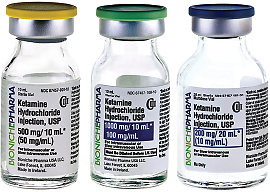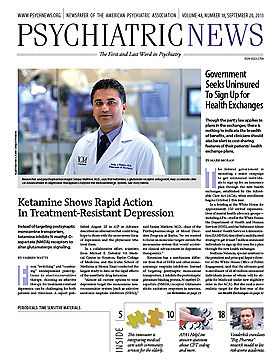From “switching” and “combining” antidepressant prescriptions to electroconvulsive therapy, choosing an effective therapy for treatment-resistant depression can be challenging for both patients and clinicians. A report published August 28 in AJP in Advance described an alternative that could bring hope to those with the more severe form of depression and the physicians who treat them.
In a collaborative effort, scientists from Michael E. Debakey VA Medical Center in Houston, Baylor College of Medicine, and the Icahn School of Medicine at Mount Sinai conducted the largest study to date on the rapid effects of the anesthetic drug ketamine.
“Almost all current options to treat depression target the monoamine neurotransmitter system [such as selective serotonin reuptake inhibitors (SSRIs)],” said Sanjay Mathew, M.D., chair of the Psychopharmacology of Mood Disorders Program at Baylor, “so we wanted to focus on molecular targets outside the monoamine system that would accelerate clinical advancement in depression therapeutics.”
Ketamine has a mechanism different from that of SSRIs and other monoaminergic reuptake inhibitors. Instead of targeting presynaptic monoamine transporters, it inhibits the postsynaptic glutamate binding protein, N-methyl-D-aspartate (NMDA) receptor. Glutamate elicits excitatory responses in neurons, and abnormalities in glutamatergic signaling have been implicated in major depressive disorder.
Previous studies demonstrated rapid effects for ketamine in patients with treatment-resistant depression; however, the studies lacked adequate sample sizes and appropriate pharmacological controls.
“Our study was the first controlled trial to compare ketamine with another drug that causes psychoactive side effects…and the first trial of ketamine to be conducted at more than one site….The findings were replicated across both sites,” Mathew told Psychiatric News.
The study enrolled 73 patients with a primary diagnosis of major depressive disorder as assessed with the Structured Clinical Interview for DSM-IV. All participants had a history of multiple antidepressant therapy failure.
Patients were randomly assigned to receive either a single intravenous infusion of ketamine at a concentration of 0.5 mg/kg or a transient infusion of the active placebo, midazolam. Changes in depression symptoms were evaluated by the Montgomery-Asberg Rating Scale (MADRS) and Quick Inventory of Depressive Symptomatology—Self-Report (QIDS-SR), and adverse physiological events were assessed with the Patient-Rated Inventory of Side Effects and the Clinician-Administered Dissociative State Scale.
Dramatic Drop in Depression Symptoms
Within 24 hours, patients who were given ketamine demonstrated an 18-point drop in the MADRS score, compared with a 12-point drop in the midazolam group. QIDS-SR scores had also significantly improved in the ketamine group. The ketamine cohort’s drug response rate was 64 percent, while the response was 28 percent in the midazolam group.
Though mean MADRS and QIDS-SR scores and drug response rates did not differ between both groups at an evaluation seven days post treatment, 44 percent of those in the ketamine group still had a positive response at that evaluation.
The most serious side effects—reported up to four hours after ketamine infusion—were dizziness, headache, nausea, dry mouth, decreased energy, and poor coordination. Ketamine also increased mean blood pressure from 122/72 mm Hg to 141/81 mm Hg within one hour of infusion, whereas midazolam did not cause a blood pressure spike. Mean blood pressure was normalized after four hours in the ketamine subjects.
The researchers concluded that “the large and rapid antidepressant effect of ketamine we observed in these patients is especially significant given the poor prognosis for improvement with currently available antidepressant treatments in treatment-resistant major depression….This further supports NMDA receptor modulation as a novel mechanism for accelerated improvement in severe and chronic forms of depression.”
Too Soon to Consider Clinical Use
Psychiatrist John Rush, M.D., the vice-dean of clinical sciences at Duke-National University of Singapore, told Psychiatric News that “the effects of ketamine [in this study] on treatment-resistant depression appear to be both quick and quite substantial.” He added, however, that “it would be premature and potentially dangerous to turn this into practice.” Rush explained that according to the study’s results, ketamine comes with a range of side effects, and it is unknown how ketamine will be tolerated in a larger and “more realistic” population.
“Patients in this trial were highly selected to [have] treatment-resistant depression without other commonly encountered issues like substance abuse and history of psychotic symptoms,” said Rush.
Mathew agreed. “Yes, caution is urged, and we recommend that ketamine be administered by clinicians who are experienced in the administration of anesthetic agents and who have expertise in cardiorespiratory monitoring,” he cautioned.
Mathew said that other clinical studies, including a trial in phase 2 development by Janssen Research & Development LLC, are under way and are investigating the more-detailed molecular mechanism of ketamine associated rapid antidepressant effects.
Mathew noted that he and his colleagues are conducting larger studies that are seeking to optimize ketamine dosage in treatment-resistant depression.
The study was funded by the National Institute of Mental Health, the Brain & Behavior Research Foundation, the Brown Foundation Inc., and the National Center for Advancing Translational Sciences. ■


